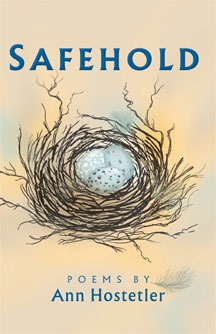| |
|
 |
|||||||
| Cascadia home | |||||||||
|
Summary: Starting with the image of November thunderstorms worthy of July followed next day by snow flurries, in Safehold's title poem Ann Hostetler grieves that the weather's off, that racists rise, making her wonder “How long can we deny the signs?” Poignantly she concludes, “Like Noah, I build an ark, / gathering what I love inside— / this frail coracle / of words.” Safehold flier PDF Reviewing Safehold in Evangelicals for Social Action, Adriel Rose observes that the poem "For Those Who Would Save The World” perfectly complements 'Safehold.' Those of us who have seen the signs and have wept over them should take note, and ask what we could possibly do to bring any light to the darkness that has enveloped us." "Safehold
teaches what I never want to forget: that all people are my neighbors,
that my mother is my original love, that any child shunned,
slaughtered, shamed is my child. Hostetler has written a true work of
Christian poetry: these poems incarnate Christ's elegant, dark hand,
unknowable and open, ready to carry us all.” —Rebecca Gayle Howell, Author, American
Purgatory “Hostetler, who has done so much for Mennonite literature as teacher and editor, now gives us a second collection of her own plainspoken poems. Their message? Refuse to be shunned. Breathe. Build an ark. Seek forgiveness not perfection. Write what you love. Again and again, Hostetler calls us to everyday mindfulness in the midst of our grief: failing parents, worrisome children, the world’s uncertain course.” —Julia Spicher Kasdorf, Author, Shale Play: Poems and Photographs from the Fracking Fields “Hostetler
illuminates the gifts, intimacies, and complications of family,
heritage, and contemporary life. With clear-eyed gaze she artfully
‘traces our shapes,’ our celebrations and tragedies, inviting us to
‘live as though the body were the soul.’” —Jean Janzen, Author, What
the Body Knows "Hostetler gathers her living and dead into these poems, generations of seekers and travelers, and seats them at the table, telling stories that serve as a safehold against the confusion and violence of the world—while also using ‘the bellows of the breath’ to praise beauty, to comfort with a failing yet steadfast love.” —Todd Davis, Author, Native Species and Winterkill Quote:
The
opening poem, “Heirlooms,” shows us Hostetler's ability to transmute
the ordinary into more, as she weaves together images of gardening
connecting heirloom tomatoes and our bodies themselves: “All my life
I've tried to live as though / the body were the soul. As though
planting / and reaping were prayer. Our bodies a perishable / husk to
feed the soul's kernel, the earth / absorbing what's left, seeding
/next year's volunteers.” Market: Anyone interested in personal poems by a gifted writer from a life lived between 9/11 and the cultural, political, and church complexities of our current times. Shelving: Poetry; Anabaptist-Mennonite literature; BISAC: Poetry; RTM: 640 Poetry. The Author: Ann
Hostetler, Professor of English, Goshen (Ind.) College, is the author of Empty
Room with Light and editor of A Cappella: Mennonite Voices in
Poetry. She is editor of The Journal for Mennonite Writing
at https://mennonitewriting.org/. Publisher: Cascadia
Publishing House LLC |
|||||||||






